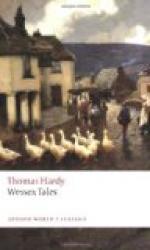But Elijah and the boy, in the excitement of their position, quite forgot the injunction. Moreover, Oliver Giles, a man of seventeen, one of the dancers, who was enamoured of his partner, a fair girl of thirty-three rolling years, had recklessly handed a new crown-piece to the musicians, as a bribe to keep going as long as they had muscle and wind. Mrs. Fennel, seeing the steam begin to generate on the countenances of her guests, crossed over and touched the fiddler’s elbow and put her hand on the serpent’s mouth. But they took no notice, and fearing she might lose her character of genial hostess if she were to interfere too markedly, she retired and sat down helpless. And so the dance whizzed on with cumulative fury, the performers moving in their planet-like courses, direct and retrograde, from apogee to perigee, till the hand of the well-kicked clock at the bottom of the room had travelled over the circumference of an hour.
While these cheerful events were in course of enactment within Fennel’s pastoral dwelling, an incident having considerable bearing on the party had occurred in the gloomy night without. Mrs. Fennel’s concern about the growing fierceness of the dance corresponded in point of time with the ascent of a human figure to the solitary hill of Higher Crowstairs from the direction of the distant town. This personage strode on through the rain without a pause, following the little-worn path which, further on in its course, skirted the shepherd’s cottage.
It was nearly the time of full moon, and on this account, though the sky was lined with a uniform sheet of dripping cloud, ordinary objects out of doors were readily visible. The sad wan light revealed the lonely pedestrian to be a man of supple frame; his gait suggested that he had somewhat passed the period of perfect and instinctive agility, though not so far as to be otherwise than rapid of motion when occasion required. At a rough guess, he might have been about forty years of age. He appeared tall, but a recruiting sergeant, or other person accustomed to the judging of men’s heights by the eye, would have discerned that this was chiefly owing to his gauntness, and that he was not more than five-feet-eight or nine.
Notwithstanding the regularity of his tread, there was caution in it, as in that of one who mentally feels his way; and despite the fact that it was not a black coat nor a dark garment of any sort that he wore, there was something about him which suggested that he naturally belonged to the black-coated tribes of men. His clothes were of fustian, and his boots hobnailed, yet in his progress he showed not the mud-accustomed bearing of hobnailed and fustianed peasantry.




